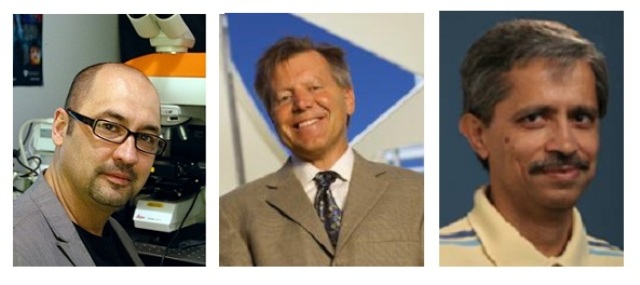Three Bourns College of Engineering professors at the University of California, Riverside have received a three-year, $360,000 grant from the National Science Foundation to further study the thermal properties of graphene, which is expected to lead to new approaches for the removal of heat from advanced electronic and optoelectronic devices.
 From left, Alexander A. Balandin, Roger Lake and Ashok Mulchandani
From left, Alexander A. Balandin, Roger Lake and Ashok Mulchandani
Alexander A. Balandin, a professor of electrical engineering and founding chair of the materials science and engineering program, Roger Lake, a professor of electrical engineering, Ashok Mulchandani, a professor of chemical engineering, will be cooperating on the project called: “Two-dimensional performance with three-dimensional capacity: Engineering the thermal properties of graphene.”
Balandin will serve as principal investigator and be responsible for materials characterization and thermal measurements. Lake will perform theoretical and computational studies while Mulchandani will conduct material synthesis and characterization.
The unique properties of graphene – a single atomic plane of carbon atoms – were discovered in Balandin’s Nano-Device Laboratory at UC Riverside in 2008. In recent years, the attention of the research community was focused on the properties of twisted bilayer graphene – a special form of graphene bilayers where atomic planes are rotated against each other by some angle.
The objective of this grant is to investigate the effect of rotation angle on the thermal conductivity of twisted bilayer graphene. The UCR team will study the possibility of suppressing the phonon coupling in twisted graphene layers, allowing for the transfer of extraordinary large heat fluxes. The phonons are quanta of crystal lattice vibrations that carry heat in graphene.
The possibility of maintaining two-dimensional properties of graphene in bulk materials through the use of twisting the stacking angles is a transformational concept giving us the best of both worlds – the enhanced performance of two-dimensional combined with the capacity of three-dimensional systems.